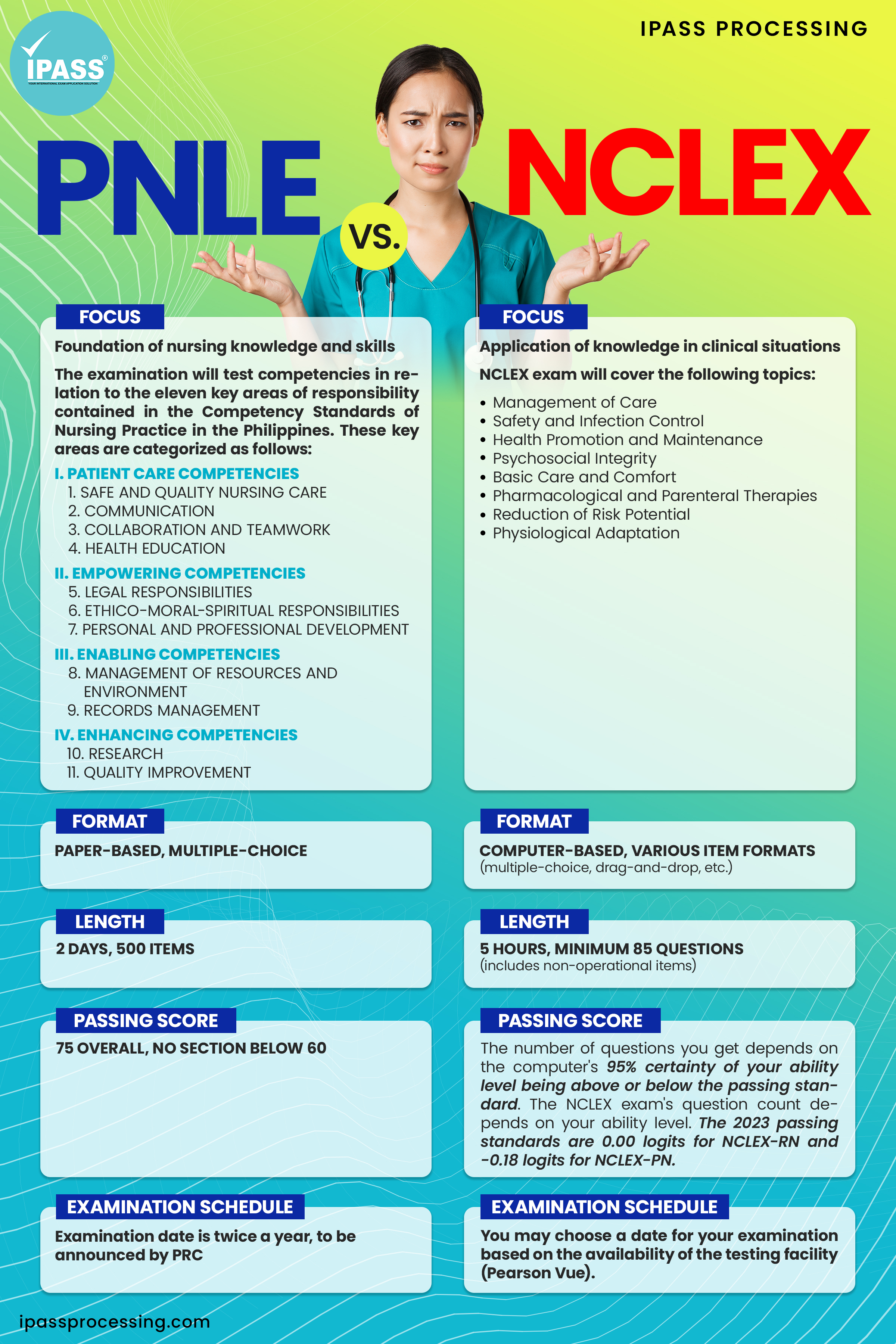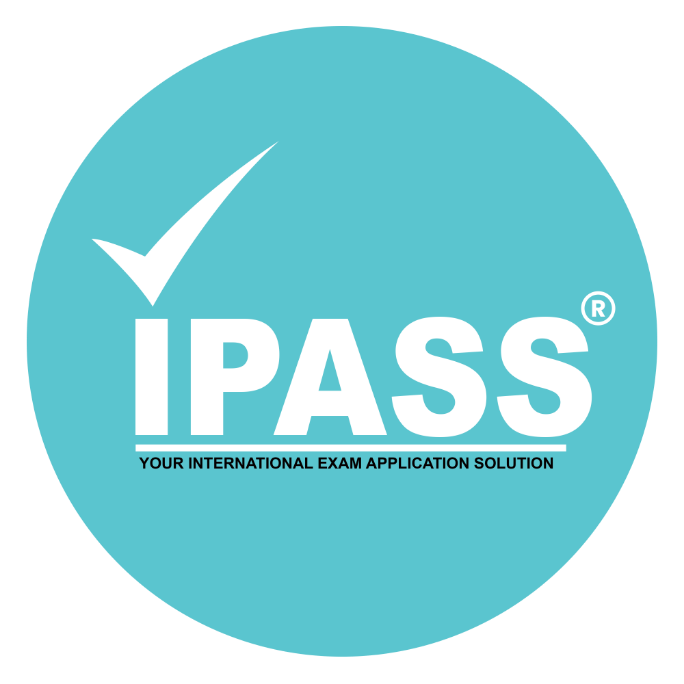Your cart is currently empty!

The Ultimate NCLEX Journey: Your Path after the PNLE
(Estimated Reading Time: 8 minutes)
After the November 2023 Philippine Nursing Licensure Examination (PNLE) results were released, newly licensed nurses faced the dilemma of where to work. While others are considering practicing here in the Philippines, some are embarking on an international nursing career. Thus, nurses must pass the National Council Licensure Examination (NCLEX) after PNLE to become licensed nurses outside the Philippines.
Navigating the transition from one to the other requires a clear understanding of their significance, key differences, and adequate preparation strategies. This comprehensive guide can help you gain a detailed understanding of the difference between PNLE and NCLEX. Furthermore, it can equip you with the knowledge to transition from PNLE to NCLEX and launch your dream career abroad.
The Significance of PNLE in Your International NCLEX Journey
There are many reasons why PNLE is important in jumpstarting your healthcare dream abroad. It includes the following reasons:
Gateway to Global Opportunities
Passing the PNLE is the golden ticket for Filipino nurses seeking to practice overseas. Moreover, many countries recognize it as a benchmark for nursing competence, making it a prerequisite for eligibility. Thus, earning your PNLE license demonstrates your foundational knowledge and skills, opening doors to a world of possibilities.
Boosting International Recognition
A successful PNLE score garners credibility and validation of your nursing expertise. This recognition is valuable for skilled nurses in the United States, Canada, the United Kingdom, Australia, New Zealand, and the Middle East. Furthermore, it is a testament to your dedication and competence, enhancing your marketability in the global nursing landscape.
Preparing You for NCLEX Success
The PNLE curriculum and format lay a solid foundation for your NCLEX Journey. Hence, enhancing your foundational nursing expertise and refining your critical thinking abilities through the PNLE empowers you. So, you’ll adeptly confront the rigors of globally recognized assessments like the NCLEX.
Difference of PNLE vs NCLEX:
Understanding the significance of NCLEX involves recognizing the shared aspects between PNLE and NCLEX. Now, let’s look into their distinct differences.
1. Understanding NCLEX
The NCLEX exam, managed by the National Council of State Boards of Nursing (NCSBN), is a gateway to the nursing profession. Moreover, it evaluates nurses’ ability to provide safe and high-quality care. In addition, it is also customized for different countries to assess vital skills essential for patient safety.
Achieving success in the NCLEX is crucial for foreign nurses as it helps them obtain an international license. In this sense, NCLEX is critical to the US, Australia, and Canada to ensure compliance with competency standards.
2. Adapting PNLE Knowledge
The PNLE focuses on understanding the Philippine healthcare system and theory, while the NCLEX concentrates more on practical clinical skills and decision-making. Both tests check nursing competence, but the PNLE prioritizes local context and theory knowledge, ensuring well-rounded nurses in the Philippines.
3. Key Differences and Similarities: Recognizing the nuances between PNLE and NCLEX is crucial for successful preparation. Here’s a table summarizing the key points:

You can also check the video below for a more detailed explanation of the differences between NCLEX and PNLE. Conducted by our esteemed CEO, Ms. Rachelle Olivar, this video details the main differences between the PNLE and NCLEX assessments. Furthermore, ensure you stay informed about the latest updates about NCLEX and more by subscribing to our YouTube channel.
What is the Best Way to Prepare for NCLEX
There are numerous ways to prepare for the NCLEX. Here are some strategies that can assist you in navigating the challenging NCLEX journey:
1. Supplement your PNLE knowledge with NCLEX-specific online question banks focusing on critical thinking and scenario-based questions.
Look for resources tailored to the country’s NCLEX format and content areas. So, get comfortable with the computer-based format. Moreover, creating a simulated exam environment by taking mock tests and utilizing online testing platforms is essential for NCLEX preparation. Additionally, you can subscribe to NCLEX review materials, which offer comprehensive content to test your knowledge.
2. Explore the guidance from seasoned mentors or specialized study programs designed for Next Generation NCLEX preparation.
Many NCLEX review programs are available, and IPASS is one of them. IPASS offers a Next Generation NCLEX online review and mentoring academy led by experienced US-registered nurses globally. Moreover, the IPASS Online Review and Mentoring Academy provides a comprehensive and detailed NCLEX review program.
With a proven track record of success, the program has already helped thousands of nurses prepare and pass the NCLEX exam. In addition, these resources offer valuable expertise and proven strategies. Thus, it’s essential to research all available options and choose the program that best fits your learning style and needs.
3. Develop effective test-taking strategies and time-management skills.
Practice pacing yourself and answering different question formats efficiently. So, strategic time management is vital to mastering the NCLEX. Practice timed tests, flag difficult questions for later, and focus on applying knowledge to real-world scenarios. Think like a nurse, not just recall facts.
Incorporating these strategies will transform the NCLEX journey into a well-navigated path to success. Remember, practice makes perfect. So, use online testing platforms, mock exams, and study resources to hone your skills before the big day.
Navigating the Challenges of Nursing Career Abroad Post-NCLEX
Starting a nursing career abroad after completing the NCLEX exam introduces numerous opportunities and challenges. Below are some examples of the challenges and opportunities that you may encounter:
Employment Prospects and Opportunities
Successfully passing the NCLEX opens doors to diverse employment opportunities across the globe. Depending on your chosen country and specialization, you can explore hospitals, clinics, community health settings, and more. Hence, you can research the job market and network with other Filipino nurses abroad to gain insights.
Should you seek sponsorship, we collaborate with an esteemed partner, Health Carousel, renowned for offering sponsorship opportunities. Moreover, the sponsorship extends various benefits, including NCLEX processing discounts, alongside scholarships for IPASS Online Review and Mentoring Academy.
Cultural Adaptation and Challenges
Embarking on a nursing career abroad involves adapting to a new healthcare system and cultural environment. Here are some challenges you might encounter:
1. Adjusting to a new healthcare system: Be prepared for differences in terminology, documentation practices, and equipment compared to the Philippine healthcare system.
2. Overcoming cultural differences: Understand the local culture and communication styles to effectively interact with patients and colleagues. So, learn basic phrases in the local language to bridge communication gaps.
3. Providing care to diverse patient populations: You may encounter patients from different ethnicities, backgrounds, and belief systems. Thus, respect cultural sensitivities and tailor your approach to provide culturally competent care.
These challenges require resilience, adaptability, and a willingness to learn. Embrace them as opportunities for personal and professional growth, allowing you to develop into a culturally competent and well-rounded healthcare professional.
Growth and Professional Development
Working as a nurse abroad exposes you to diverse healthcare practices, expands your knowledge base, and hone your clinical skills. Moreover, you’ll encounter new technologies, treatment methods, and ethical dilemmas, stimulating your critical thinking and problem-solving abilities. Furthermore, this constant learning environment fosters personal and professional growth, enriching your career and shaping you into a globally informed healthcare professional.
Additional Tips for Your NCLEX Journey
1. Start planning early: Research NCLEX requirements and prepare well in advance. The earlier you start, the better equipped you’ll be to face the challenges.
2. Network with other nurses: Connect with Filipino nurses who have successfully transitioned from PNLE to NCLEX and established their careers abroad. Moreover, their insights and experiences can be invaluable.
3. Stay up-to-date: Stay informed about the latest NCLEX changes and exam content. In addition, the NCSBN website is a valuable resource for staying updated.
By following the tips and strategies outlined in this guide, you can confidently navigate the transition from PNLE to NCLEX. Furthermore, it will enable you to confidently embark on your dynamic NCLEX journey within the global healthcare landscape.
The Takeaway
Transitioning from PNLE vs NCLEX and embarking on a nursing career abroad is challenging yet rewarding. However, understanding the significance of each exam and thoroughly preparing for the NCLEX is essential. Moreover, embracing these challenges sets the stage for a successful career in global healthcare.
Remember, preparation, perseverance, and adaptability are critical to your success. So, with dedication and proper guidance, you can make your dream of a global nursing career a reality. The world awaits your skills and commitment. Thus, prepare today, embrace the challenges, and chase your dream of a fulfilling nursing career abroad.
IPASS: Your Partner in Global Nursing Success
At IPASS Processing, we are committed to empowering Filipino nurses to achieve their international career goals. Our comprehensive NCLEX Online Review and Mentoring program is led by experienced, internationally licensed nurses. Moreover, IPASS provides tailored guidance and support to excel in processing your NCLEX USA, NCLEX Canada, and NCLEX Australia. In addition, we also offer valuable partnerships with sponsorship agencies and resources to help you find the perfect job match.
Ready to take the first step toward your global nursing career? Contact us today to learn more about our programs and how we can help you achieve your dreams.
Recommended Reads
- NCLEX Pass Rates 2024: Key Insights You Need to Know
- May 2025 PNLE Results: Top Schools & Topnotchers
- Ace the May 2025 PNLE: Final Week Preparation Tips
- Nursing Job Opportunities in the Philippines for USRNs
- AHPRA Registration 2025: Updated Pathways for IQRNs
Recommended Topics
- ASCPi (1)
- Australia (8)
- Canada (5)
- Exam Tips (28)
- General (120)
- IPASS Events (10)
- IPASS News (129)
- Middle East Nursing (17)
- NCLEX (64)
- New Zealand (3)
- NMBI Ireland (1)
- Online Review (13)
- PNLE Online Review (3)
- Tourist Visa (1)
- UKNMC (1)
- US Nursing (12)
- UWorld (1)
- VisaScreen (3)








Leave a Reply